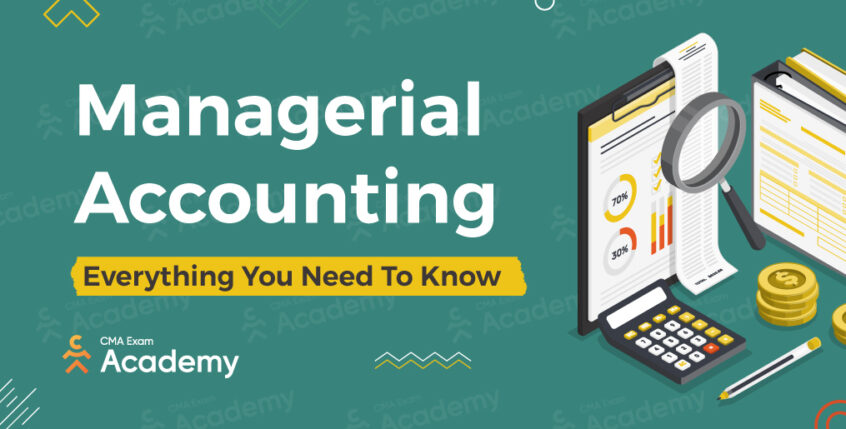So you want to get into managerial accounting. It’s easy to see why: accountants in managerial roles tend to enjoy better salaries and higher rates of job satisfaction than junior and staff accountants.
Even a lower-level position in management can be a stepping stone to your dream role, from senior accountant all the way up to CFO.
Throughout my career, I’ve watched accountants work hard to land managerial accounting roles that have skyrocketed their careers to new heights.
If you’re interested in managerial accounting, you’re in the right place. Today, I’ll break down all the basics: core concepts, job opportunities, and frequently asked questions so you’re prepared to land the job you want.
Keep reading to learn more.
- What Is Managerial Accounting?
- The Scope of Managerial Accounting
- Learning Managerial Accounting With the CMA Credential
- Managerial Accounting Methods
- Jobs in Managerial Accounting
- Managerial Accounting FAQs
- Become an Industry Leader With CMA Exam Academy
Originally published on July 18th, 2023, this article was updated and republished on April 26th, 2024.
What Is Managerial Accounting?
Let’s start with a definition: managerial accounting is a position in which skilled accountants use financial data and analysis to support a business with informed decision-making. The objective of these roles is to help direct a company toward its financial goals.
Managerial accounting has three focus principles—planning, strategic decision-making, and leadership.
The professionals in these positions play a pivotal role in a business’s financial decision-making and strategic planning. They’re critical executives and team members who are highly valued by the board and executive team.
Some key responsibilities of managerial accountants are:
- Cost Management: Managerial accountants analyze and track costs related to production, operations, and other business activities, including determining the costs of producing goods or services, identifying cost drivers, and evaluating cost efficiency.
- Planning, Budgeting, and Forecasting: They create budgets and make financial forecasts based on past performance and future expectations.
- Performance Management: Managerial accountants develop performance metrics and KPIs to track goal achievement.
- Internal Reporting: They prepare internal financial reports, such as profit and loss statements, cost reports, and variance analyses, to communicate financial information to management and department heads.
- Technology & Analytics: They utilize advanced analytics and technology to enhance data-driven decision-making, improving accuracy in financial predictions and operational efficiency.
- Corporate Finance: Managerial accountants play a vital role in corporate finance by managing company finances and advising on financial strategies to help enhance business growth and profitability.
- Capital Investment Decisions: They analyze potential investment opportunities and assess their financial viability to ensure the best allocation of capital resources for long-term benefits.
- Business Decision Analysis: Managerial accountants evaluate business processes and financial data to support strategic decision-making and drive business improvements.
Unlike financial accounting, which focuses on reporting financial information to external parties like investors and regulators, managerial accounting focuses more internally and supports internal decision-making processes.
This means landing a managerial accounting position will give you an excellent opportunity to impress your team while building valuable skills and relationships.
The Scope of Managerial Accounting
The definition sounds simple enough. But there’s a bit more to it than that.
Managerial accounting is different from financial accounting.
Unlike financial accounting, managerial accountants don’t always adhere strictly to financial accounting standards.
Because the goal of professionals in these roles is to support the management team, ad-hoc reports can be presented in a way customized to suit the unique needs of the business. They don’t need to adhere to GAAP since the ad-hoc reports are informal and for internal use only. However, all financial statements like the Profit & Loss, Balance Sheet, etc must follow GAAP.
Some key ways managerial accountants leverage data and financial information for their companies:
- Identifying trends, opportunities, and risks
- Measuring risk, reward, and ROI
- Analyzing current and historical information
- Interpreting data to draw conclusions about future possibilities
- Presenting findings, recommendations, and conclusions to upper management
And some of the direct applications for data and conclusions:
- Product costing
- Budgeting
- Projecting and forecasting
- Strategic planning
- Financial analysis
The ultimate goal of managerial accounting is to support intelligent decision-making. This means a managerial accounting team needs to process a lot of information from multiple levels of a business and condense it into clear, actionable recommendations for the leadership team.
Learning Managerial Accounting With the CMA Credential
If you want to take the next step into the world of managerial accounting, there are a few ways you could start. My personal favorite is taking the path of a Certified Management Accountant.
The CMA is a highly-respected and revered certification for accounting professionals at any stage of their career. It prepares you for a career in accounting leadership by demonstrating your competencies in the key skills hiring managers look for in candidates.
The results speak for themselves: CMAs enjoy an average salary that is as much as 58% higher than their noncertified peers. They have high rates of job satisfaction, access to better job opportunities, and a competitive edge in an increasingly crowded job market.
Some management accountant methods and concepts you could learn include:
- Financial data analysis
- Cost management and budgeting
- Decision-making and decision analysis
- Investment decisions
- Risk management
- Forecasting and strategic planning
- Data analytics
- And much more
CMAs are also known for their upstanding commitment to professional ethics. Part 2 of the CMA exam covers professional ethics, and all CMAs must complete annual ethics training as a part of their continuing professional education, or CPE requirements.
Managerial Accounting Methods
Now let’s get into the nitty-gritty.
Here are some ways in which managerial accounting is used.
Margin Analysis
One of the most important ways businesses use management accounting is for margin analysis.
Weighing the benefits and costs associated with certain decisions is critical for ensuring a company remains profitable, so managerial accounting teams ensure the company’s leaders understand the risk during the decision-making process.
This way, the team avoids costly mistakes and improves the company’s ability to achieve its objectives.
Constraint Analysis
Managerial accounting teams also use data to present recommendations concerning constraint analysis.
A company’s control over bottlenecks has a direct correlation to profitability, so this is a big one. Understanding the cause and effects of past bottlenecks can help with policy design and strategic planning.
Managerial accountants can use constraint analysis to reduce operational inefficiencies by leveraging historical data to streamline processes.
Capital Budgeting
Managerial accounting also supports capital budgeting.
Since managerial accounting is different than financial accounting, this goes beyond just revenues and expenses. Using their analytical skills, managerial accounting teams will analyze cash inflows and outflows, including non-expense items, to get a bigger picture of a company’s financial pulse.
Inventory Valuation and Product Costing
During each reporting period, a company needs to calculate the value of and costs associated with its inventory. Management accounting teams present information to support this process.
Costs could include labor, overhead, fees, duties, and materials. Understanding the value of inventory is important for understanding the cost of goods sold. It’s also necessary for the loan application process, as inventory is sometimes used as collateral.
Trend Analysis and Forecasting
Managerial accountants are the closest a company can get to hiring a fortune teller.
These professionals are skilled in forecasting, which involves gathering and analyzing current and historical data to draw conclusions about potential future outcomes.
This process is valuable to employers because it can predict key outcomes for certain decisions including ROI and potential risks.
Jobs in Managerial Accounting
There are plenty of different roles to choose from when it comes to managerial accounting. Regardless of where you are in your career, you can find an option that is within your reach.
Here are some to choose from:
- Cost accountants and budget analysts: two great options for those early in their careers. Cost accountants assess budgets and look for opportunities to save their companies money. Budget analysts use data to create budgets that improve the profitability of their organizations.
- Financial analysts: another ideal early-career option. These professionals are skilled at forecasting. They use data to analyze the potential outcomes of certain decisions and then present recommendations to the C-Suite.
- Accounting manager: when you’re ready to take your technical skills to the next level, it’s time to seek a leadership position. A position like accounting manager is a great place to start. These professionals oversee operations at their company and manage reporting and compliance.
- Chief cost accountant and budget directors: as you grow in your career, you’ll want to seek opportunities with more responsibility. Chief cost accountants manage cost accountants and direct the team toward its goals. Similarly, budget directors oversee the process of planning and creating budgets.
- Corporate controller: This senior management position is a dream job for many. It involves a lot of responsibility, as corporate controllers manage all aspects of a company’s financial policies as well as managing the accounting team.
- VP of finance: Similar to controllers, VPs of finance are heavy hitters in their organizations. They are skilled strategists and leaders who guide entire accounting departments toward the company’s goals.
- Chief Financial Officer (CFO): Becoming a CFO means joining the C-Suite with the uppermost leaders in an organization. They are responsible for all aspects of financial decision-making and they work directly with the C-Suite on major decisions like investments, policy making, and acquisitions.
Managerial Accounting FAQs
There are a few more things you should know about managerial accounting. Let’s explore.
What Types of Information Does Managerial Accounting Provide
Managerial accounting teams provide reports with recommendations that are critical in a business’s decision-making process.
This includes:
- Financial reports
- Financial metrics
- Revenue figures
- Sales reports
- Costs and expenses
- Cost controls
Using this information, accounting professionals create budgets, policies, strategies, plans, and recommendations that they then present to the executive leadership teams at their organizations.
What Are the Three Main Functions of Managerial Accounting?
The three main functions of managerial accounting are analysis, forecasting, and reporting. But truthfully, these teams serve many purposes for their companies.
The main function of any good managerial accounting team is to support its company with accurate, relevant, and timely information. This information is important for ensuring decision-makers know everything they need to know to direct the company toward its goals.
What Is the Main Focus of Managerial Accounting?
The primary focus of managerial accounting is ensuring that a company has all the information required to make sound decisions that limit risk and maximize profits.
Using budgets, forecasts, and strategic plans, these professionals paint a vivid picture of the past, present, and potential future of a company so executive leadership can guide the company toward sustainable growth and success.
Does GAAP Apply in Managerial Accounting?
GAAP — or Generally Accepted Accounting Principals — are a set of standards that govern corporate accounting.
Managerial accounting does not have to adhere to GAAP so long as the ad-hoc reports are for internal use only, and not official. However, all financial statements like the Profit & Loss, Balance Sheet, etc must follow GAAP.
This means managerial accounting reports can be used within a company to inform decisions and strategies, but they cannot be submitted as official government documents.
Become an Industry Leader With CMA Exam Academy
The path to becoming a managerial accountant isn’t easy, but it’s well worth the effort.
Throughout my career, I’ve worked with many professionals in managerial accounting — from cost accountants to CFOs.
I’ve met plenty of accounting students with big dreams. I know there are many different routes available to you, but trust me when I say the CMA is the best.
If you want to take the next step in your career, check out my 16-week accelerator exam prep course. It’s jam-packed with value: study materials, a detailed plan, and one-on-one coaching. Plus, it’s guaranteed to help you pass the exam so you can get one step closer to the career of your dreams.

Hi, I’m Nathan Liao (aka the CMA Coach)! For the last 10 years, over 82,000 accounting and finance pros came knocking at my door seeking guidance and help. If you’re also aiming to conquer the CMA exam on your very first try—without wasting away time or money—you’ve found your ultimate guide. Dive in deeper to discover more about me and the dedicated team that powers CMA Exam Academy. Click here and let’s embark on this journey together!


